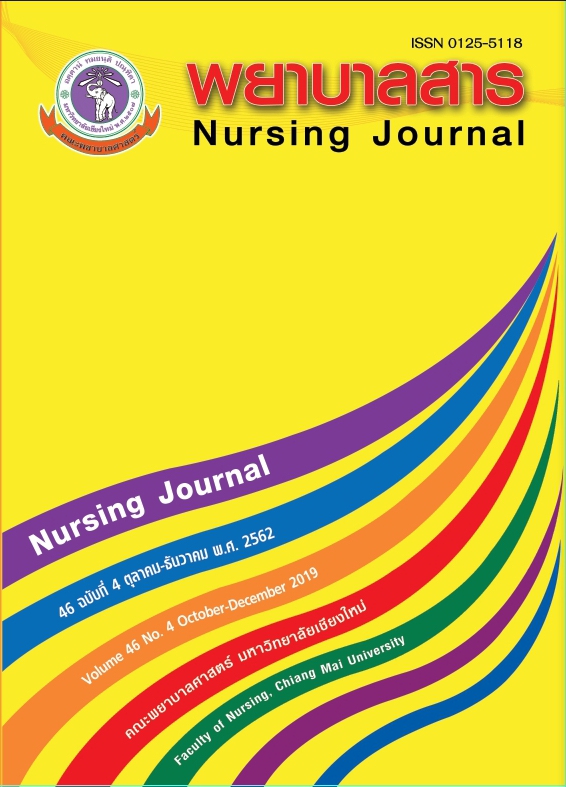Effects of Self-management Enhancement on Quality of Life and Rehospitalization Rate Among Elderly with Heart Failure
Keywords:
self-management enhancement, self-management behaviors, quality of life, re-hospitalization rate, The elderly with heart failuresAbstract
Heart failure is a major chronic illness frequently found in elderly populations. To maintain quality of life, patients need to effectively self-manage their health conditions. This two group pre-test /post-test experimental research aimed to investigate the effect of self-management initiatives on quality of life and measurement of re-hospitalization rates among elderly patients with heart failure, attending the outpatient department at Maharaj Nakorn Chiang Mai Hospital during May-August, 2014. The participants included 44 elderly patients randomly selected from those who met the inclusion criteria. The participants were randomly assigned into equal experimental and control groups. The experimental group received 6-weeks of self-management health enhancement with 2.5 hours of weekly activities. The control group received usual nursing care. Data were collected using a Personal Data Recording Form, Minnesota Living with Heart Failure Questionnaire, and Re-Hospitalization Recording Form. Data were analyzed using descriptive statistics, t-test, and Z-test.
The result of this study revealed that, after receiving the self-management enhancement plan, the quality of life of elderly persons with heart failure was significantly higher than those receiving usual nursing care. The elderly persons receiving this self-management enhancement plan had better quality of life than those receiving usual nursing care (p<.001), while the re-hospitalization rate tended to decrease, however without statistical significance (p>.001).
The results from this study indicate that self-management enhancement improves quality of life and tends to decrease re-hospitalization rates in elderly populations with heart failure. Therefore, nurses should administer the self-management enhancement plan to elderly patients, to help them effectively self-manage their health, prevent complications, and attain a better quality of life
References
Barlow, J. H., Wright C. C., Turner A. P., & Bancroft, G. V. (2005). 12-month follow-up study of self-management training for people with chronic disease:Are changes maintained over time?. British Journal of Health Psychology, 10, 589–599.
Chunnawong, K.(2004).Effects of Exercise Self Efficacy on Functional Capacity and Quality of Life in Patients with Heart Failure. Facualty of Nursing. Chiang Mai University. (In Thai)
Ditewing, J. B., Blok, H., Havers, J., & Veenendaal, H. V. (2010). Effectiveness of self-management interventions on mortality, hospital readmissions, chronic heart failure hospitalization rate and quality of life in patients with chronic heart failure: A systematic review. The European Journal of Heart Failure, 6, 643– 652.
Dongbo, F., Hua, F., McGowan, P., Yi-e, S., Lizhen , Z., Huiqin, Y., et al. (2003). Implementation and quantitative evaluation of chronic disease self-management programme in Shanghai, China: randomized controlled trial. Bulletin of the World Health Organization, 81(3), 174-182.
Gardetto, N.J. (2011). Self-management in heart failure: where have we been and where should we go?. Journal of Multidisciplinary Healthcare ,4,39–51.
Institute for Healthcare Improvement. (2009). Effective Interventions to Reduce Hospitalizations :A Survey of the Published Evidence. Fromhttp://www.ihi.org/offerings/Initiatives/STAAR/Documents/STAAR A Survey of the Published Evidence.pdf
Jovicic, A., Holroyd-Leduc, J. M., & Straus, S. E. (2006). Effects of self-management intervention on health outcomes of patients with heart failure: a systematic review of randomized controlled trials. BMC Cardiovascular Disorders, 6(43), 1-8.
Lorig, K. R., Stewart, A., Ritter, P., Gonzalez, V. M., Laurent, D., & Lynch, J. (1996). Outcome Measures for Health Education and Other Health Care Interventions. San Francisco. CA:Sage publication.
Lorig, K. R., Ritter, P., Stewart, A. L., Sobel, D. S., Browm, B. J., Bandura., et al. (2001). Chronic disease self-management program: 2-year health status and health care utilization outcomes. Effective Clinical Practice, 4(6), 256-262.
Lorig, K.R., & Holman, H.R. (2003). Self-management education: History, Definition, Outcomes, And Mechanisms. Annals of Behavioral Medicine, 26(1), 1-7.
McAllister, M., Dunn, G., Payne, K., Davies, L., & Todd, C. (2012). Patient empowerment: The need to consider it as a measurable patient-reported outcome for chronic conditions. Health Services Research,12(157),1-8.
Michie, S., Stralen, M. V., West, R. (2011). The behavior change wheel: A new method for
characterizing and designing behavior change interventions. Implementation Science, 6(42).
Oxenham, H., Sharpe, N. (2002). Cardiovascular aging and heart failure. The European Journal of Heart Failure.5,427–434.
Policy and Strategy Office of the Permanent Secretary for Public Health.(2012). Number and rate of illness per 100,000 populations Classified by illness . Health Policy and Planning Office of the Permanent Secretary for Public Health. (In Thai)
Ritklar, L.(2009).Effectiveness of a self - management program on dyspnea, re-admission, and quality of life in congestive heart failure patients. Master of Nursing (Adult). Thammasat University. (In Thai)
Soomhirun, R.(2009).A Literature Review Related to the Management for Reducing Readmission in Patients with Heart Failure.Taksin Hospital .Bangkok. (In Thai)
Tangwochitsakun, S.(2007).Effect of Self-management Program Quality of Life Among Heart Failure Patient. Master of Nursing (Adult). Chiang Mai University. (In Thai)
World Health Organization. (1998). Development of the World Health Oranization .WHO QOL-BREF Quality of life assessment.Psychological Medicine, 28, 551-558.
World Health Organization. (2011). Global status report on no communicable diseases 2010. Retrieved. Geneva from http://www.who.int/mediacentre/factsheets/fs317/en/.
Downloads
Published
How to Cite
Issue
Section
License
บทความที่ได้รับการตีพิมพ์เป็นลิขสิทธิ์ของวารสารพยาบาลสาร
ข้อความที่ปรากฏในบทความแต่ละเรื่องในวารสารวิชาการเล่มนี้เป็นความคิดเห็นส่วนตัวของผู้เขียนแต่ละท่านไม่เกี่ยวข้องกับมหาวิทยาลัยเชียงใหม่ และคณาจารย์ท่านอื่นๆในมหาวิทยาลัยฯ แต่อย่างใด ความรับผิดชอบองค์ประกอบทั้งหมดของบทความแต่ละเรื่องเป็นของผู้เขียนแต่ละท่าน หากมีความผิดพลาดใด ๆ ผู้เขียนแต่ละท่านจะรับผิดชอบบทความของตนเองแต่ผู้เดียว






